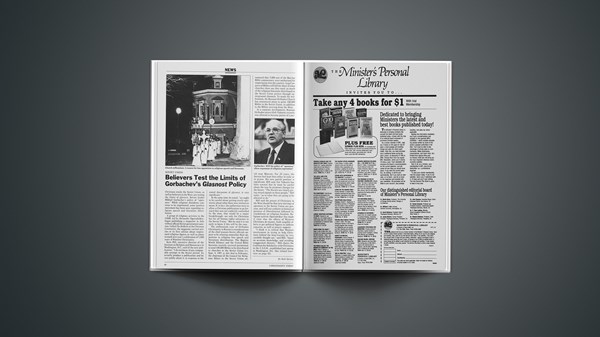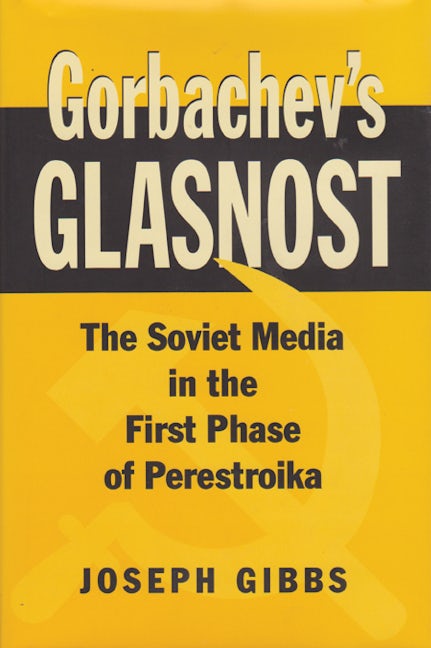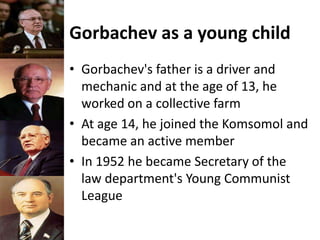Gorbachev's Policy of Glasnost Could Be Best Described as
Gorbachev was born before Stalins reign. An attempt to create a new openness in Soviet politics.

Believers Test The Limits Of Gorbachev S Glasnost Policy Christianity Today
The policy of open discussion of political and social issues which resulted in changes to the Soviet political structure.

. Glasnost and perestroika were chief components of Mikhail Gorbachevs policies in Russia. Gorbachev was noted for his policy of Glasnost that allowed freedom of expression and the loosening of controls on radio press the film industry and television. He was also the countrys head of state from 1988 until 1991 serving as the chairman of the Presidium of the Supreme Soviet from 1988 to 1989.
Gorbachev was 20 years younger than Chernenko Andropov and Brezhnev had all been born before the revolution. The truth was that the. Glasnost Russian for openess refers to Gorbachevs policy of a more open government and culture.
This adapted tool of Leninist media control became not only a part of perestroika Gorbachevs plan to rejuvenate Soviet ideology during the 1980s but also an independent concept that. Glasnost can be best described and best translated as openness. A plan to decentralize the Soviet Communist Party.
The development of a quasi-market also meant that non-essential goods could be produced on a greater scale with greater availability. The eighth and final leader of the Soviet Union he was the General Secretary of the Communist Party of the Soviet Union from 1985 until 1991. Mikhail Gorbachev Gorbachev led the USSR as General Secretary of the Communist Party from 1985.
Perestroika restructuring in Russian refers to a. Glasnost which translates to openness in English was General Secretary Mikhail Gorbachevs policy for a new open policy in the Soviet Union where people could freely express their opinions. One policy established by Mikhail Gorbachev was called glasnost.
In order to understand how significant of a factor Gorbachev policies were to the collapse of the USSR we will investigate from how significant were the reforms emplaced by Gorbachev to. The purpose of this investigation is to assess how significant Mikhail Gorbachevs Glasnost and Perestroika polices contribute to the collapse of the USSR. Criticisms of imposing liberalism include.
Mikhail Gorbachevs policies of glasnost and perestroika introduced elements of free market economics and democratic reforms which led to the breakup of the Soviet Union. Glasnost was the policy of openness allowing greater individual and political freedoms within the USSR to open up society and thus allow the reform an d restructuring of the economy. Due to senility Brezhnev had not been in effective control of the country during his last few years and Kosygin had died in 1980.
It is also particularly attached to reforms of the judicial system so a sort of extra. During an interview in 1989 Mikhail Gorbachev is quoted as saying I detest lies 1. Gorbachev opened a Pandoras box of demands for change that the Soviet system could not handle.
Mikhail Gorbachevs policy of glasnost could be best described as a program of reforms to encourage Soviet competition with the West. An effort to restructure the Soviet economy. This can best be described as the policy of industrializing the country as quickly as possible by directing all resources into developing industry.
It was this yearning for the truth that lead him to introduce the policy of glasnost literally openness in English. Glasnost Openness in Russian. Gorbachev had secretly planned the demise of the USSR all along.
Gorbachevs more specific policies like khrozraschyot Commercialisation could have potentially been implemented to re-ignite production in the Soviet economy. The policy of restructuring the Soviet. With glasnost Soviet citizens no longer had to worry about neighbors friends and acquaintances turning them into the KGB for whispering something that could be construed as.
Gorbachevs early political reforms 1985-86. Since Gorbachev did not intend to dismantle the Soviet communist system with these reforms I guess you could say they were very unsuccessful from that point of view. You could also link glasnost to transparency.
Glasnost most commonly translated into English as openness was a key concept of Mikhail Gorbachevs administration as general secretary of the Communist Party of the Soviet Union. Which of the following best describes why Gorbachevs reforms led to the total collapse of the Soviet Union and communism. Gorbachevs use of force against protestors.
This adapted tool of Leninist media control became not only a part of perestroika Gorbachevs plan to rejuvenate Soviet ideology during the 1980s but also an independent concept that. Learn about Cold War history Gorbachevs reforms and. Openness and freedom of information.
Allowing forms of privately-owned businesses. Law on State Enterprise. The liberal press exploited this.
It was a reform policy introduced by Gorbachev that was meant to re-duce corruption loosen restrictions on the media and allow more freedom of expression and association. Glasnost most commonly translated into English as openness was a key concept of Mikhail Gorbachevs administration as general secretary of the Communist Party of the Soviet Union. Mikhail Sergeyevich Gorbachev born 2 March 1931 is a Russian and former Soviet politician.
The Politburo was dominated by old men and they were overwhelmingly Russian. Gorbachevs appointment as General Secretary was the shift of power of one generation to the next. Factory managers responsible for own affairs.
When Brezhnev died in 1982 most elite groups understood that the Soviet economy was in trouble. However this policy quickly paved the way for public opinion to slip beyond Gorbachevs grasp. It was supposed to be associated with the freedom of speech where the press and the public could attend court hearings and for the sentence to be read out in public.
Between 1988 and 1989 new political organisations such as the opposition party the Democratic Union being tolerated and the publishing of books by.

Mikhail Gorbachev I M Bashed For Glasnost But It Was Key For Change Russian Politics Diplomacy Tass


0 Response to "Gorbachev's Policy of Glasnost Could Be Best Described as"
Post a Comment